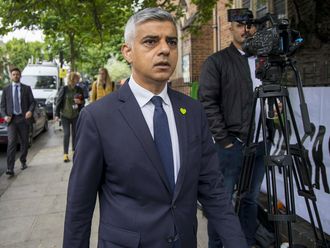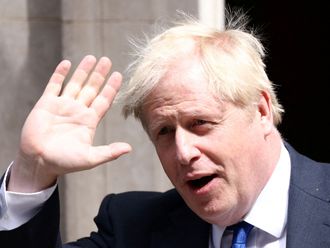Berlin: Germany froze billions of euros in assets of the Libyan Central Bank and other state-run agencies Thursday, the latest move to attempt to cut off funding to Moammar Gaddafi's embattled regime.
The German asset freeze came into effect just as the European Union announced that it was extending its own financial sanctions, adding five financial institutions whose assets and resources will be frozen to a list of more than two dozen individuals close to the Libyan leader.
A German government official, speaking on condition of anonymity in line with policy, said that the Economy Ministry move to freeze Libyan assets were "based on decisions by the European Union".
He added that further economic sanctions at the EU against Libya - like targeting state-run firms working in the oil sector - were possible.
The German and EU sanctions announced Thursday go beyond sanctions approved by the UN Security Council targeting Gaddafi, his family and associates, as well as restricting Libyan entities that hold stakes in a host of European companies, including British publisher Pearson and Italy's Unicredit bank.
As of last Friday, officials said approximately $3.3 billion of Libyan assets had been frozen in Britain, including $160 million worth of Libyan banknotes impounded by UK border officials on a ship.
The US has also frozen some $32 billion in Libyan funds, according to the Treasury Department.
It was not immediately clear, though, whether there would be an effect on Gaddafi's ability to wage war.
The New York Times reported Thursday, citing unidentified American and other intelligence officials, that the Libyan leader had "tens of billions" in cash secreted away in Tripoli, allowing him to continue his fight against rebel forces.
Germany on March 1 provisionally blocked a bank account worth $2 million ($2.8 million) held by one of Gadhafi's sons - the same day that Austria ordered the freezing of banks accounts belonging to Gaddafi, his family members and his allies.
Economy Minister Rainer Bruederle said the wider sanctions announced Thursday would raise the total amount of assets blocked to a figure "in the billions" but he did not elaborate.
Also affected are accounts belonging to the Libya Africa Investment Portfolio, the Libyan Foreign Bank and the Libyan Investment Authority.
"The ... measures are a clear reaction to the developments in Libya - the brutal suppression of the Libyan freedom movement can now no longer be financed from funds that are in German banks," Bruederle said in a statement.
"The German government is giving a clear signal that it is firmly on the side of those who are pushing for freedom, democracy and justice in Libya."
The EU sanctions take effect on Friday, according to a statement from the EU presidency.
In addition to freezing the "funds and economic resources" of five unidentified institutions, they also add one name to a list of 26 individuals "deemed responsible for the violent crackdown on the civilian population since the fifteenth of February and subject to an assets freeze".











